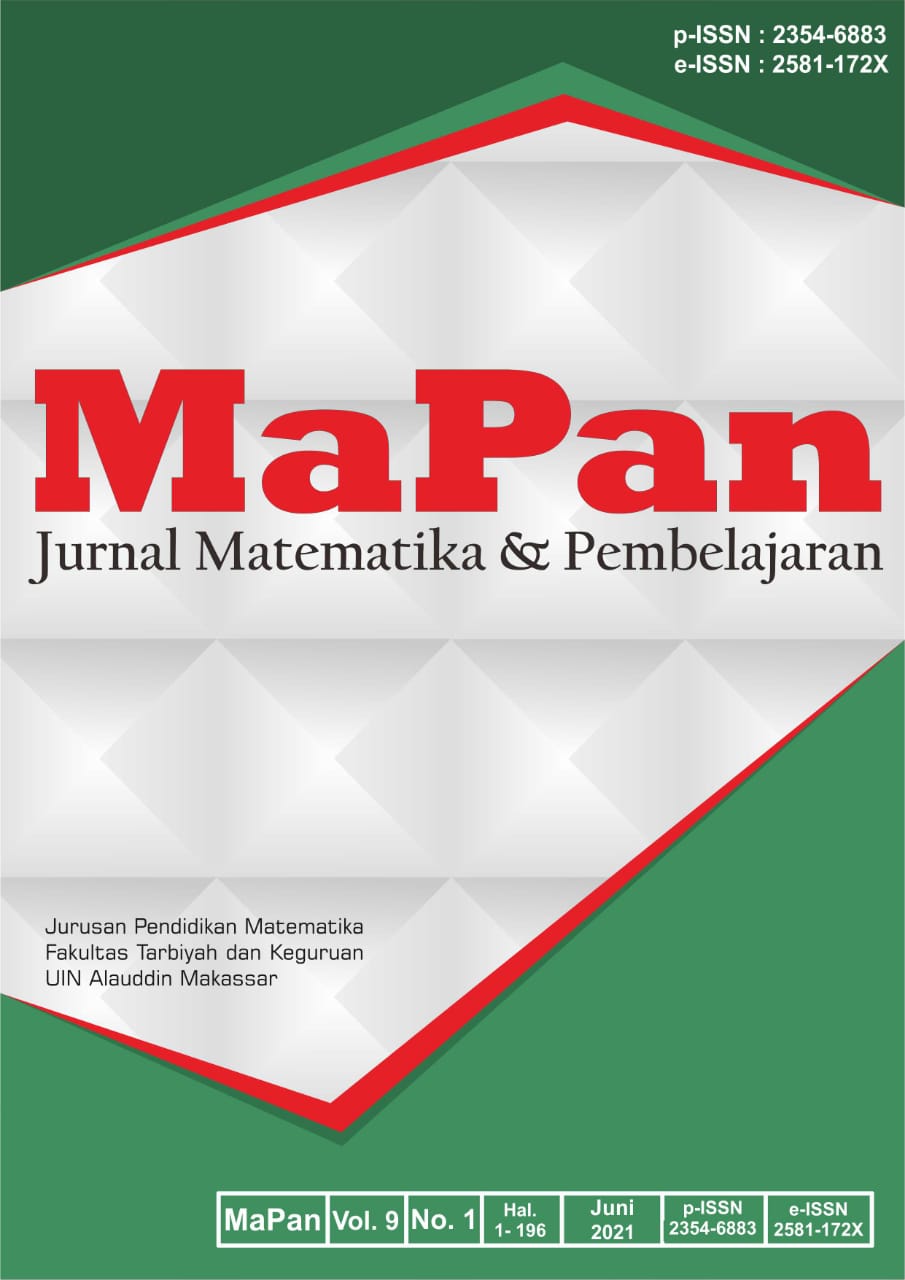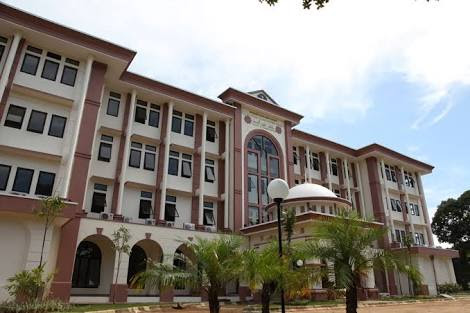DIGITAL LITERACY IN USING GEOGEBRA LEARNING MEDIA IN TERMS OF SELF-DIRECTED LEARNING
Abstract
Digital literacy is important to improve the quality of education, especially in mathematics learning which can develop and engage students in exploring the efficient digital world for learning mathematics. The purpose of this study is to analyze the digital literacy of grade VIII students of SMP Negeri 1 Karangrejo in using GeoGebra learning media in terms of self-directed learning. This type of research is descriptive qualitative. The subjects of this study consisted of six students, and the instruments used were lesson plans, self-directed learning questionnaires, student response questionnaires, and interview guidelines. The result of this research shows that digital literacy with students who have high level for self-directed learning are able to fulfill all of indicators for digital literacy including being able to understand instructions for use and how to use the GeoGebra application, explain the information in the GeoGebra application, do the exercises correctly, participate in exchanging ideas with friends and develop their creativity into a new work in the GeoGebra application, students with moderate self-directed learning are only able to meet five digital literacy indicators including being able to understand instructions for use and explain the information in the GeoGebra application, do the exercises correctly, participate in brainstorming with friends and try to develop their creativity into a new work on the GeoGebra application, and students with low self-directed learning are only able to meet two digital literacy indicators including able to understand the instructions for use and be able to do practice questions correctly.Downloads
References
Akbar, Firman, & Anggaraeni, F. D. (2017). Teknologi dalam pendidikan: Literasi digital dan self-directed learning pada mahasiswa skripsi. Jurnal Indigenous, 2(1), 28–38. https://doi.org/10.23917/indigenous.v1i1. 4458.
Asngari, D. R. (2015). Penggunaan geogebra dalam pembelajaran geometri. Seminar Nasional Matematika dan Pendidikan Matematika, pp. 299–302. Yogyakarta: UNY.
Hague, C., & Payton, S. (2010). Digital Literacy Across the Curriculum. UK: Futurelab.
Hohenwarter, M., Hohenwarter, J., Kreis, Y., & Lavicza, Z. (2008). Teaching and learning calculus with free dynamic mathematics software geogebra. 11th International Congress on Mathematical Education, pp. 1-9. Mexico: ICME.
Irhandayaningsih, A. (2020). Pengukuran literasi digital pada peserta pembelajaran daring di masa pandemi COVID-19. Anuva, 4(2), 231–240. https://doi.org/10.14710/anuva.4.2.231-240.
Keskin, O., Nilgun, Ozata, F. Z., Banar, K., & Royle, K. (2015). Examining digital literacy competences and learning habits of open and distance learners. Contemporary Educational Technology, 6(1), 74–90. Retrieved from https://eric.ed.gov/?id=EJ1105611.
Kesumawati, N. (2017). Geogebra sebagai solusi untuk mengkonstruksi konsep-konsep matematika di era digital. Prosiding Seminar Nasional Pendidikan. Retrieved from https://jurnal.univpgri-palembang.ac.id/index.php/Prosidingpps/article/view/1458.
Kurniawati, J., & Baroroh, S. (2016). Literasi media digital mahasiswa Universitas Muhammadiyah Bengkulu. Jurnal Komunikator, 8(2), 51–66. Retrieved from https://journal.umy.ac.id/index.php/jkm/article/view/2069.
Martharina, D. A., Warjiman, & Santoso, B. R. (2016). Perbedaan self directed learning mahasiswa dengan menggunakan metode pembelajaran lecture dan problem based learning. Jurnal Keperawatan STIKES Suaka Insan, 11(2), 1–8. https://doi.org/10.51143/jksi.v1i2.38.
Muliawanti, S., & Badu Kusuma, A. (2019). Literasi digital matematika di era revolusi industri 4.0. Prosiding Sendika, 5(1), 637–646. Retrieved from http://eproceedings.umpwr.ac.id/index.php/sendika/article/view/728.
Murni, V., Sariyasa, S., & Ardana, I. M. (2017). GeoGebra assist discovery learning model for problem solving ability and attitude toward mathematics. Journal of Physics: Conference Series, 895(1). https://doi.org/10.1088/1742-6596/895/1/012049.
Nur, I. M. (2016). Pemanfaatan program geogebra dalam pembelajaran matematika. Jurnal Matematika dan Pendidikan Matematika (Delta-Pi), 5(1), 10–19. https://doi.org/10.33387/dpi.v5i1.236.
Nurjanah, E., Rusmana, A., & Yanto, A. (2017). Hubungan literasi digital dengan kualitas penggunaan e-resources. Lentera Pustaka: Jurnal Kajian Ilmu Perpustakaan, Informasi Dan Kearsipan, 3(2), 117–140. https://doi.org/10.14710/lenpust.v3i2.16737.
OECD. (2015). Programme for International student assessment result for PISA 2015.
Pianda, D., & Rahmiati. (2020). Peningkatan kreativitas siswa dalam pembelajaran matematika dengan google classroom sebagai kelas digital berbantuan aplikasi geogebra. Al-Khawarizmi: Jurnal Pendidikan Matematika Dan Ilmu Pengetahuan Alam, 4(2), 93–111. https://doi.org/dx.doi.org/10.22373/jppm.v4i2.7672.
Prasistayanti, N. W. N., Santyasa, I. W., & Sukra-Warpala, I. W. (2019). Pengaruh desain e-learning terhadap hasil belajar dan keterampilan berpikir kreatif siswa dalam mata pelajaran pemrograman pada siswa SMK. Kwangsan: Jurnal Teknologi Pendidikan, 7(2), 138–155. https://doi.org/10.31800/jtp.kw.v7n2.p138--155.
Priwantoro, S. W., Fahmi, S., & Ariesta Y., D. (2019). Pelatihan peningkatan kemampuan IT bagi guru matematika menggunakan GeoGebra. Jurnal Terapan Abdimas, 4(2), 203. https://doi.org/10.25273/jta.v4i2.4847.
Salehudin, M. (2020). Literasi digital media sosial youtube anak usia dini. Jurnal Ilmiah Potensia, 5(2), 106–115. https://doi.org/10.33369/jip.5.2.%25p.
Sugiyono. (2014). Metode penelitian pendidikan: pendekatan kuantitatif, kualitatif dan R&D. Bandung: Alfabeta.
Suratman, A., Afyaman, D., & Rakhmasari, R. (2019). Pembelajaran berbasis TIK terhadap hasil belajar matematika dan motivasi belajar matematika siswa. Jurnal Analisa, 5(1), 41–50. https://doi.org/10.15575/ja.v5i1.4828.
Utami, F. M. (2020). Pentingnya pendidikan karakter dalam literasi digital matematika. Seminar Nasional Matematika Dan Pendidikan Matematika, 3(1), 1–9. Retrieved from https://seminarmat.ump.ac.id/index.php/semadik/article/view/291.
Zulnaidi, H., & Zamri, S. N. A. S. (2017). The effectiveness of the geogebra software: The intermediary role of procedural knowledge on students’ conceptual knowledge and their achievement in mathematics. Eurasia Journal of Mathematics, Science and Technology Education, 13(6), 2155–2180. https://doi.org/10.12973/eurasia.2017.01219a.
Copyright (c) 2021 Maylita Hasyim, Henny Fathul Kurniawati

This work is licensed under a Creative Commons Attribution 4.0 International License.


